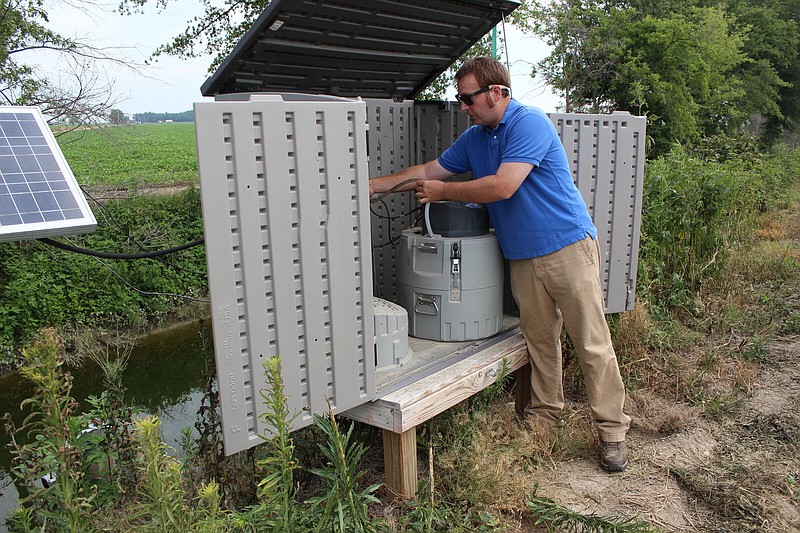LIGHT -- The University of Arkansas System Division of Agriculture's Discovery Farms program is making monitoring water quality on a farm as easy as checking a mobile phone app.
"We've never collected and given farmers data like this, and this has given them an indication of how efficient and how well they're performing," said Mike Daniels, co-leader of the Discovery Farms project for the University of Arkansas Division of Agriculture Cooperative Extension Service crop, soil and environmental science department.
"We're just trying to document what's really happening and from that they can use that data to maybe make adjustments and changes."
The Discovery Farms program -- which started in 2009 -- comprises 17 privately owned farms where growers farm the land and university researchers visit the farms. Researchers visit 13 of the farms to monitor water quality with the goal of providing farmers hard data on the effectiveness of water conservation practices.
The Anheuser-Busch Foundation supports three Discovery Farms in Arkansas and the company buys the rice grown on the farms.
The Pratt Farm in Light -- between Paragould and Walnut Ridge -- is one of the Discovery Farms supported by Anheuser-Busch.
"I rent the farm that they're doing this experiment on, but I do own some farms that they work on," said Joe Pratt of Pratt Farm. "We farm about 6,000 acres of rice and soybeans."
Pratt can go about the business of running the farm and researchers will drop by sometimes to visit and check the two water monitoring systems on the farm to see if Pratt's crops are getting enough water.
"And it's not just about water quality, this [water monitoring system] can also tell the amount of runoff, which is very important," Daniels said.
"We do it for plant nutrients, nitrogen and phosphorous and sediment. But we also look at the runoff volume, so if we get a rainfall, we get an idea of how much of that rainfall got in the soil ... and when we irrigate, we know how much we put on, so we can see how much we ran off. I think when you look and see you're down 50% or 60% of irrigation runoff, it motivates a farmer to say they want to get closer to 90% and save water."
A phone application makes it possible to get alerts and view hourly updates remotely on how much water plants are getting at different soil depths in different fields, said Mike Hamilton, irrigation specialist for the UA Cooperative Extension Service.
This year, researchers added moisture sensors at the farm to determine how much water a crop is using per day, Hamilton said.
A nearby water pump automation system allows farmers to turn the system on and schedule irrigation for fields remotely. Recently installed cameras can also be checked to make sure the poly pipe for the irrigation system is working, Hamilton said.
The systems make farming more efficient, which could help farmers who don't have enough workers, but more importantly, they can be checked from anywhere, Daniels said.
"Farms are so spread out now, they don't farm all around their shop if they rent land," Daniels said. "It may be an hour to get to some of their fields."
There are plans to start a Discovery Farms educational center in August, in partnership with the University of Arkansas at Pine Bluff, implementing the same water monitoring practices on a 50 acre farm on campus to teach water conservation, Daniels said.
Anheuser-Busch has been involved with the program since 2019.
The company is implementing similar model farms for barley near Fargo, N.D. in partnership with North Dakota State University; with barley in Fairfield, Mont. in partnership with Montana State University; and another model farm in partnership with Soil Health Institute, said Bill Jones, rice agronomy manager based at the Anheuser-Busch agricultural facility in Jonesboro.
The company sponsors similar work with hops, mainly with the Hop Growers of America; Anheuser-Busch gets hops from farmers in Washington, Oregon and Idaho, Jones said.
Anheuser-Busch added 'smart agriculture' goals to the company's 2025 sustainability plan, written in 2017, Jones said; one of the purposes of the agreement with the university is to promote conservation practices in rice farming.
Large consumer product groups like the Kraft Heinz Co., PepsiCo and General Mills have set out on similar paths and Anheuser-Busch wanted to set its own sustainability goals with an eye toward climate change, Jones said.
"Since we have a direct relationship with our farmers, we're in a unique position because we're verticalized," Jones said.
"I know who my rice farmer is. I know who my barley farmer is. We have our own rice mill, we have our own barley malt houses, so we have full visibility and full transparency within our supply chain. If we can help the farms become more resilient by implementing regenerative practices, then the goal is that they can weather climate change and we can stabilize yield and we can stabilize quality."
The Anheuser-Busch agricultural facility in Jonesboro is a working rice mill, which allows the company to contract directly with farmers primarily in Arkansas and a few in Missouri, buy their long grain rice, mill it and supply it to 11 out of the company's 12 U.S. breweries, Jones said.
The rice goes into Budweiser, Bud Light and Michelob Ultra beers. Anheuser-Busch is the largest end user of rice in the United States, Jones said.
Anheuser-Busch buys roughly 18.4 million bushels of rice a year directly from farmers, most of them in Arkansas.
